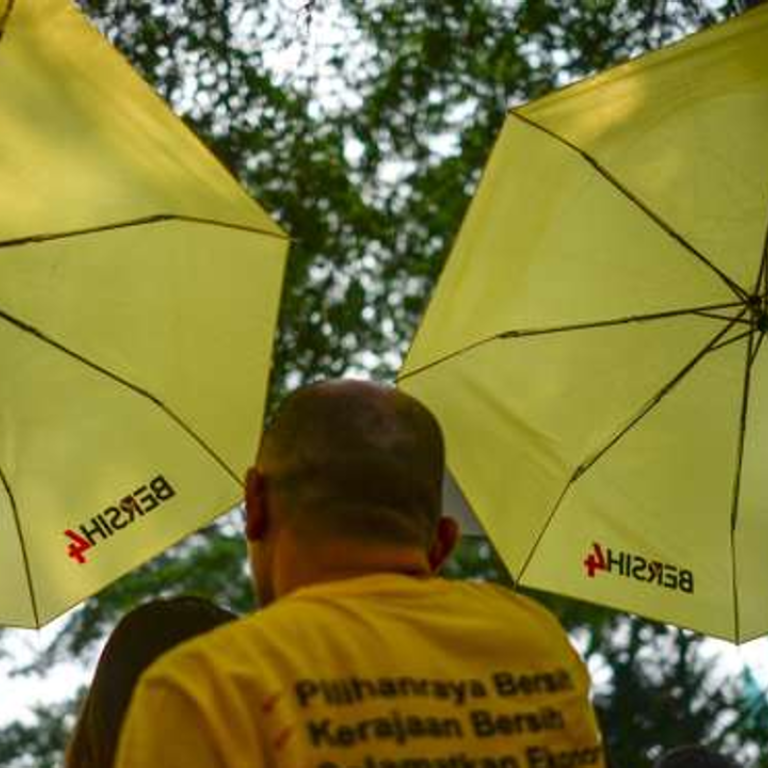
Fresh clampdown on Malaysian activists reveals Najib’s ‘failed governance’, critics say
At least 15 activists and members of electoral reform group Bersih have been arrested, with Malaysia’s Deputy Prime Minister warning that there will be more to be expected
Malaysia’s government is attempting to quash political activism through new security laws and fresh arrests. But its critics say the extreme measures only reveal the extent of Prime Minister Najib Razak’s authoritarian regime.
Organised by the electoral reform group Bersih, thousands took to the streets of Kuala Lumpur on Saturday to demand the resignation of Prime Minister Najib Razak over his alleged involvement in a grand corruption case. The rally drew as many as 40,000 protesters according to official estimates, but some claim the crowd was larger. This was the organization’s fifth mass anti-government demonstration since 2007.
At least 15 activists and members of the political opposition have since been arrested, including Bersih chairwoman Maria Chin Abdullah who was taken in under a new security law meant for terrorists. Passed in 2015, the controversial law—called the Security Offences (Special Measures) Act or SOSMA—enables officials to arrest and detain people without a warrant and bail.
A statement from the Barisan Nasional government released on Saturday also declared it was unlawful for parties to unseat a democratically-elected administration via street protests.
This weekend’s developments were widely seen as a fresh crackdown on anti-government critics following the introduction of the National Security Act in August, which enabled the government to establish martial law in any part of the country.
“These crude attempts to intimidate Malaysian civil society activists and human rights defenders further damages [the] Barisan Nasional government....This clampdown on its critics is another sign of the Najib government’s failed governance and bankrupt agenda,” Bersih said in a statement on Saturday.
“The arrests show that PM Najib is grasping at straws to stop the Bersih rally. The Malaysian authorities must immediately end the arbitrary arrest and harassment of Bersih members and supporters and refrain from impinging on their right to freedom of peaceful assembly,” echoed Andrea Giorgetta of Paris-based human rights organization FIDH.
Deputy Prime Minister Ahmad Zahid Hamidi told local media that more arrests were expected, from both Bersih and the pro-government Red Shirts group that staged a counter-rally on Saturday. The police classified both protests as illegal.
Malaysia is increasingly creating a dangerous atmosphere for political freedoms, Claire Rewcastle Brown, founder of online publication The Sarawak Report, told CNBC’s “ The Rundown “ on Monday.
“Within the country, it is an intimidating situation for journalists, civil rights activities, and opposition politicians—basically anyone who wants to speak the truth regarding 1MDB.” The latest laws and arrests are aimed at shutting this story up, but it’s not proving successful so far, she continued. “My site was banned for disseminating false information, but people still managed to access it, that’s new media for you.”
The Sarawak Report has been a key chronicler of graft in Malaysia. Together with the Wall Street Journal in 2015, it launched an alarming expose, built around documents and emails, that reportedly showed the PM receiving $681 million from state investment fund 1Malaysia Development Berhad (1MDB). Investigations into the entire affair are on-going in six countries , including the U.S. and Switzerland, and have “raised issues of governance, accountability and transparency in Malaysia,” Societe Generale economists said in a recent note.
Rewcastle Brown and Abdallah have both faced the wrath of the government’s aggressive crackdown on opponents, which have also included former attorney general Abdul Gani Patail and ex-deputy Prime Minister Muhyiddin Yassin. Political strategists widely believed both were removed from their respective posts for being too critical of Najib.
“Malaysia has asked Interpol to arrest and extradite me but again, but it’s not getting much luck there,” said London-based Rewcastle Brown. Abdallah, who spoke to CNBC on Friday before her arrest, said she had been receiving regular death threats.
But despite the administration’s suppressive mechanisms, both believe Malaysians would continue to protest.
Najib’s administration has claimed that Bersih rallies have only frustrated the country by producing a national political fatigue and while Abdallah did admit to some political weariness among the public, she said it did not curb people’s enthusiasm to fight for a leadership change.
“If we keep quiet and don’t do anything, the consequences will be worse. We have to continue telling our government that this, the abuse of power and laws to silence dissent, cannot carry on,” she stated on Friday.
Najib his denied any wrongdoing and has been cleared by the country’s new attorney general Mohamed Apandi Ali, who was appointed last year after his predecessor Patail was terminated. The 63-year old Najib has managed to weather the storm thus far thanks to the unflappable backing of elites who keep him in power but there is speculation he may call snap polls ahead of the June 2018 general election to retain his post.
Should he proceed to do so, it would only further reveal the government’s hypocrisy, according to Rewcastle Brown.
“The parliamentary system that both Malaysia and Britain share enables the PM to call elections at any time, but it also behoves the PM to step down if his leadership stands under the kind of scrutiny that Najib faces now,” she pointed out, noting that the British Prime Minister resigned following results of the U.K.’s Brexit referendum.

